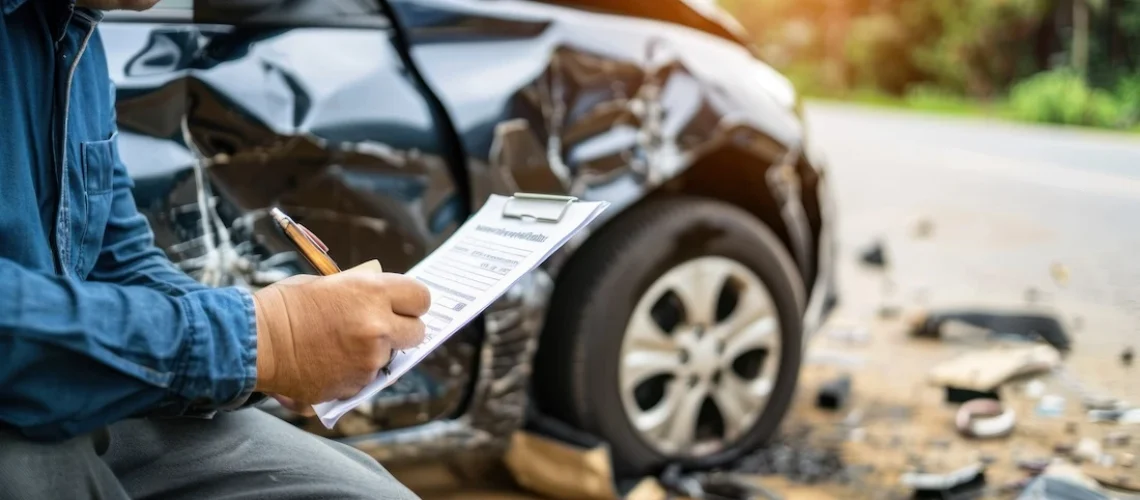Navigating the aftermath of a car accident can feel overwhelming, particularly when dealing with insurance adjusters. Often, the initial offers made by these professionals can leave policyholders questioning if they’re receiving fair compensation. Understanding how to dispute these offers is crucial for ensuring you receive what you deserve.
In California, insurance companies are bound by specific regulations, and policyholders have rights designed to protect them. Familiarizing yourself with these rights, alongside best practices for disputing an adjuster’s offer, can empower you to take action when necessary. Being well-informed is the first step toward ensuring a favorable outcome for your claim.
This article will guide you through the process of disputing your car insurance adjuster’s offer, outlining essential documentation, effective communication strategies, and when to consider legal assistance. By the end, you’ll be better equipped to navigate the complexities of insurance negotiations and advocate for your rightful compensation.
Understand Your Rights as a Policyholder
Navigating the aftermath of an auto accident in California can be stressful, especially when dealing with insurance carriers. Knowing your rights as a policyholder is crucial. If your claim is unjustly denied or you feel the settlement offer is inadequate, you’re entitled to dispute the insurance adjuster’s decision.
Firstly, be aware that you can appeal internally within the insurance company. Prepare your case with robust evidence—eyewitness accounts, photographs, police reports, and other documentation related to property damage and medical expenses are key.
Don’t hesitate to hire an independent claims adjuster if necessary. Though it’s an additional expense, it often strengthens your challenge and helps in obtaining a fair settlement. Remember, insurance companies are obligated by California law to act in good faith and conduct thorough investigations into claims. You are not at the mercy of your insurance carrier—negotiation is part of the claims process. If met with resistance or pressure from the adjuster, stand firm and consider presenting a counteroffer. And if the situation escalates, legal assistance from a personal injury attorney or law firm may become necessary to ensure your rights are protected.
Gather Essential Documentation
After experiencing an auto accident in California, ensuring that you have all necessary documentation is a fundamental step towards disputing your insurance adjuster’s offer. It’s imperative to collect all relevant documents that reflect the pre-accident condition of your vehicle, such as service history and receipts for any upgrades, repairs, or maintenance performed. This gives a clear picture of your car’s upkeep and value.
Moreover, all evidence of communication between you and the insurance company should be retained. This includes any written correspondences, emails, recorded phone conversations, and notes taken during those conversations. They can serve as valuable proof if your insurance carrier’s practices come into question during the claims process.
Understanding your insurance policy’s coverage limits is also essential. Be familiar with the fine print regarding how your insurer calculates the actual cash value (ACV) of your vehicle. This knowledge can be crucial when assessing whether the offered settlement is fair and when constructing your counteroffer.
If you find that your insurance company’s offer does not reflect the true worth of your losses, document your findings and prepare a well-researched counteroffer. Back up your position with the evidence you’ve gathered, and ensure it aligns with the terms of your insurance coverage. A detailed, evidence-based approach will enhance your ability to negotiate a more suitable settlement.
Collect Medical Bills
In the realm of personal injury claims, medical bills are key to substantiating your case. They provide tangible proof of the expenses you’ve endured as a result of your car accident. It’s not just the bills themselves that are necessary, but also additional medical records which can fill out the narrative of your injury and recovery process. If the insurance adjuster has challenged your claim on the grounds of insufficient documentation, bolster your response with comprehensive health records.
Be open and upfront with the adjuster about any medical expenses you’ve paid. If your financial burden has grown beyond the initial report, update your claim to reflect these costs. This ensures the adjuster has a clear understanding of the total impact of the accident on your finances.
In instances where you’re claiming for lost wages due to injury, detail the medical reasons for your inability to work. Such details add validity to your claim for these additional compensations. Understanding and clearly communicating the full spectrum of your medical expenses will put you in a stronger position to challenge the initial settlement offer and argue for rightful compensation for both economic and non-economic damages, including pain and suffering.
Compile Vehicle Valifications
When your vehicle is deemed totaled, accurately assessing its value becomes crucial. Factors such as make, model, year, body style, and mileage all come into play. A Certified Collateral Corporation (CCC) report can be particularly helpful, providing a valuation that many insurance adjusters rely upon. It’s vital to review this report to ensure that the listed information about your vehicle’s trim level and condition is correct.
Moreover, conducting a local market survey and gathering listings of comparable vehicles can help establish your car’s fair market value. By presenting these findings, you fortify your position when negotiating your insurance settlement.
If you receive an unsatisfactory offer for your totaled vehicle, remember it’s your right to request a written explanation from the adjuster. This document should detail the methodology and evaluations underpinning their proposed settlement amount. If your own research suggests your vehicle is worth more, don’t hesitate to present your evidence, such as local sales data for similar cars, to counter their estimate. Demonstrating that your vehicle has a higher market value than the adjuster’s assessment can be instrumental in negotiating a more favorable loss settlement.
Compile Vehicle Valuations
If you’re faced with a totaled car situation, it’s crucial to compile meticulous vehicle valuations to negotiate effectively with your insurance adjuster. Start by obtaining a Certified Collateral Corporation (CCC) report. This report is commonly used by insurance adjusters and reflects the value of your car, considering make, model, body style, and mileage. You must review this report for accuracy, checking that factors like the vehicle’s trim level and condition are correctly represented.
Additionally, conduct a local market survey by listing comparable vehicles for sale in your area. This will give you concrete figures to support your claim that the insurance adjuster’s offer might not reflect the fair market value of your car.
When you receive an unsatisfactory offer from your insurance adjuster, promptly request a written explanation. This document should outline the details of the estimates and methodologies used to reach the settlement offer. With these insights and your own valuation data, you’re equipped to challenge the adjuster’s assessment. Clearly present your evidence, showcasing that your vehicle holds a higher value based on local sale prices of similar vehicles, to fortify your negotiation stance for a better settlement outcome.
Analyze the Initial Offer
When you receive an initial offer from an insurance adjuster in California, it’s essential to examine it thoroughly. Adjusters from insurance companies take into account various factors when deciding on settlement amounts. These can range from specifics of the accident to personal injuries and property damages documented. Sometimes a modest offer could emerge if the adjuster has insufficient information about the extent of the injuries you’ve suffered or the damage to your property.
Bear in mind that the insurance company might also believe it has a strong chance of winning if the case goes to court, which could influence the initial offer. Additionally, if there’s any indication of contributory negligence – meaning you may have had a role in causing the accident – this could considerably impact the adjuster’s calculus, often leading to a lower offer.
Furthermore, it’s important not to overlook the strategic aspect of negotiation from the insurance carrier’s perspective. Low-ball offers are not uncommon as they are a way for the company to cut costs. This practice exploits the claimant’s potential urgency to resolve the matter, particularly if the claimant is unaware of the true value of their claim or is under financial pressure due to medical expenses or other costs resulting from the accident.
Insurance companies in California are also known to use pressure tactics, pushing claimants to accept lower offers swiftly before they seek advice from a personal injury attorney. This is why it’s paramount to refrain from making a quick decision and instead take the time necessary to assess the offer carefully, possibly with legal consultation, to ensure it reflects the true value of your claim.
Identify Lowball Components
In identifying low settlement offers, it’s crucial to be aware of the components that lead to such assessments. Firstly, the lack of comprehensive information regarding your medical treatment, expenses, and the full extent of the property damage can create a gap in the adjuster’s calculations.
Insurance companies in California may also employ the state’s principle of pure comparative fault, which allows your compensation to be reduced by your percentage of fault in the accident. This possible assignment of blame to you needs careful scrutiny to ensure it’s just and based on accurate information.
Another tactic that might be used by your insurance adjuster is silence, which can create undue pressure and anxiety, nudging you towards accepting an inadequately low offer. This pressure is often heightened by the financial strain of mounting expenses post-accident.
Furthermore, do not misinterpret an initial low offer as the adjuster questioning the validity of your claim. Rather, it could be an intentional negotiation ploy designed to test your willingness to accept a quick settlement. Remember, settlements are inherently negotiable, and the first offer is typically not the best you can achieve.
Research Comparable Settlements
When challenging the insurance adjuster’s offer, it’s beneficial to have done your homework on comparable settlements. Research similar accident claims and their outcomes to help you set a realistic and fair value for your vehicle and the broader scope of your claim.
Approach negotiations with an informed ballpark figure, including insights from similar cases. This reinforces your position and serves as a counterweight to any undervaluing from the insurance adjuster. Understanding the pre-accident value of your vehicle is crucial; factors such as the market value, anticipated repair costs, and any potential long-term medical needs resulting from the accident will significantly affect a reasonable settlement amount.
Gathering extensive and organized documentation, including police reports, photographic evidence, mechanic’s assessments, and repair cost estimates, will bolster your argument against an inadequate offer. This reinforces your standpoint and puts the onus on the insurance carrier to reconsider their position.
Awareness of the types of settlements, including the difference between full and offset settlements, empowers you to negotiate terms that cover all your losses, not just immediate vehicle damages, but also medical treatment, lost wages, and additional compensation for distress caused by the accident.
Invariably, the claims process can be complicated, and insurance adjusters are skilled negotiators. It’s often beneficial to engage personal injury attorneys or accident lawyers to aid in securing a fair settlement. Legal professionals can guide you through the process and defend against bad faith tactics from the insurance carrier.
Write a Formal Response
When faced with a settlement offer from your insurance adjuster that doesn’t meet your expectations or cover your damages sufficiently, writing a formal response is a critical step in the negotiation process. This response should be detailed and methodical, encompassing a direct but courteous tone that reflects both your discontent with the offer and your readiness to engage in further negotiations.
In your formal response:
- Express thanks for the received offer, indicating your intention to resolve the claim amicably.
- Provide a clear statement that you find the offer unsatisfactory, with an objective explanation as to why.
- Request a detailed explanation from the insurer regarding how they calculated the initial settlement amount.
- Enhance your response by attaching supplementary documentation, such as police reports, medical records, and repair estimates, to substantiate your demand for a more reasonable offer.
- Address the emotional and psychological impacts of the accident, which should be equitably factored into the settlement.
Your written response serves as documentation of your position and becomes a fundamental part of your insurance claim file. It is also an opportunity to formalize your personal narrative surrounding the incident, going beyond mere numbers and highlighting the comprehensive effect the accident has had on your life.
Craft a Counteroffer
A counteroffer is a negotiation tactic where you propose a settlement amount that more accurately reflects the full extent of your damages and losses. The key is to propose a figure that is fair and justifiable.
When creating your counteroffer:
- Start by calculating the minimum settlement figure you are willing to accept. This will serve as a baseline for your counter negotiations.
- Expect the initial counteroffer to be rejected; insurance companies typically engage in several rounds of negotiation.
- Detail, in writing, all the elements of your accident. Enumerate the specific injuries sustained, the impact on your daily life, and include all incurred and projected medical expenses. Emotional distress and any long-term consequences should also be incorporated.
- The counteroffer should be backed by a logical rationale that can stand up to scrutiny by the insurance carrier.
- Make it clear that while you are negotiating in good faith, you are willing to take further legal action if necessary to reach a fair settlement.
Remember, your counteroffer should align with the evidence you’ve collected and the legal advice you’ve received. By demonstrating patience and persistence, you are more likely to arrive at a compensation amount that covers your needs.
Utilize Supporting Evidence
To effectively dispute your car insurance adjuster’s offer, the utilization of supporting evidence is indispensable. Having detailed and organized evidence can influence the negotiation in your favor, showcasing the gravity of your situation and the actual costs involved.
Key points in utilizing supporting evidence:
- Collate all relevant evidence such as photos of the accident scene, witness statements, and professional assessments of vehicle damage.
- If your claim was rejected, obtain a written explanation from the insurance company detailing their reasons, which will provide insight into what additional evidence might be needed.
- Consider consulting a public adjuster, who can provide an independent evaluation of the damage and might unearth disparities between their findings and the insurance company’s assessment.
- If included in your insurance policy, exploring valuation and arbitration services can be a viable alternative to lawsuits and may yield a more favorable outcome.
- Hiring a personal injury lawyer or a law firm specializing in auto accidents can be instrumental, particularly when the evidence is complex or the insurer is acting in bad faith.
It is advisable to create a comprehensive evidence folder, which could include, but isn’t limited to:
Evidence Type | Description | Notes |
|---|---|---|
Photographic Evidence | Pictures of accident site and vehicle damage | Timestamped and geotagged for authenticity |
Witness Testimonies | Recorded or written statements from witnesses | Highlight parts corroborating your account |
Professional Estimates | Detailed repair costs from reputable mechanics | Include assessments from multiple sources |
Medical Documentation | Reports from medical examinations and treatments | Outline both immediate and ongoing costs |
In conclusion, the key to disputing your car insurance adjuster’s offer lies in the strength of your written response, the well-reasoned financial demands of your counteroffer, and the persuasive power of your supporting evidence. Through careful preparation and strategic presentation, you can improve your chances of negotiating a settlement that more completely covers your losses.
Craft a Counteroffer
When you receive an insufficient settlement offer from your insurance adjuster after a car accident in California, you have the right to craft a counteroffer. This is the amount you believe accurately reflects the fair compensation for property damage, medical expenses, and any other losses you’ve incurred. It’s essential to understand that the first counteroffer might be rejected. Negotiations involve multiple exchanges until a mutually agreeable amount is reached.
To ensure your counteroffer is well-founded, include a detailed written explanation highlighting the specifics of the accident, the severity of injuries, and any medical treatment required. This thorough breakdown supports the rationale behind your counteroffer and demonstrates the disparity between your calculated needs and the insurance company’s proposal.
If, despite your efforts, the insurance carrier remains intransigent about offering a fair settlement, a personal injury attorney can take further steps by filing a lawsuit. Crafting a solid and evidence-based counteroffer is crucial; always remember, you are not under any obligation to accept the insurance adjuster’s initial proposal. Take control of the claims process and advocate for the compensation you deserve.
Utilize Supporting Evidence
When disputing your car insurance adjuster’s offer in California, it is paramount to present robust supporting evidence to fortify your case. Begin by collecting pertinent documents such as police reports, medical records detailing your injuries and treatment, repair cost estimates, and photographs of property damage and the accident scene. These elements showcase the extent of damages and your incurred expenses, thus questioning the fairness of the settlement proposed by the insurance carrier.
Supporting Evidence Checklist:
- Police reports showing details of the auto accident
- Medical records and bills related to the personal injury claim
- Repair estimates and invoices for property damage
- Photographic evidence of the accident and damages
- Quotes from alternative repair shops, if applicable
A well-documented evidence package can challenge the claims adjuster’s evaluation and bolster your appeal for a fair insurance settlement. Understanding the insurance policy’s scope and coverage limits is also essential. Armed with these documents, you demonstrate a commitment to obtaining a loss settlement that truly reflects your costs and the liability of the fault party.
Engage Legal Assistance
Rejecting the initial settlement offer from an insurance adjuster often marks the beginning of a negotiation process. It is commonly misunderstood that turning down the first offer could result in losing it or being presented with a lower subsequent one. However, rejecting the offer is a standard step that paves the way for better negotiations. Once faced with a low offer, it’s advisable to draft a meticulous demand letter outlining your position. This letter should be backed with evidence such as eyewitness accounts, photographs, and detailed medical records that strengthen your dispute.
During the appeal process, compiling a comprehensive dossier of documents is essential. Should your appeal meet resistance or get outright denied, options are still available. One may file a complaint with the state’s insurance department—a step that signals the seriousness of your grievance. Alternatively, and perhaps more effectively, consider the engagement of professional assistance.
Legal assistance can be extremely advantageous at this juncture. An attorney with experience in insurance negotiations can elevate your case with their expertise. In some instances, appointing a public adjuster who offers an independent assessment and is adept at insurance negotiations might be beneficial. A public adjuster can negotiate with the insurance company on your behalf, aiming for an increased insurance settlement that is more reflective of your actual losses and expenses incurred due to the incident.
Benefits of Hiring an Attorney
The expertise of an attorney can be pivotal in acquiring higher settlements, even after their legal fees are accounted for. Lawyers who specialize in insurance claims have an in-depth understanding of both your rights and the true valuation of your claim. They embark on negotiations with adjusters well-equipped with both knowledge and strategy.
Moreover, for many, insurance claim processes can be overwhelming. The complications manifest when determining fault and navigating the labyrinth of legal proceedings. An attorney simplifies these complexities, thereby amplifying your chances of reaching a favorable outcome. Notably, many personal injury attorneys offer their services on a contingency basis. This means that their fees are contingent upon the case being won or settled, alleviating the immediate financial burden from their clients.
In more disconcerting scenarios where an insurance claim is unjustly denied, an attorney’s role becomes even more critical. They take up the mantle to accumulate convincing evidence and construct an appeal that holds weight against the insurance company’s decision.
Choosing the Right Legal Representation
When an auto accident occurs, enlisting an experienced attorney promptly can be the difference-maker. An attorney’s early involvement often ensures the preservation of critical evidence that is liable to be lost as time progresses, hence solidifying your claim. While insurance adjusters might downplay the need for legal representation by suggesting that attorney fees would undercut your settlement, statistics indicate that claimants with lawyers frequently receive higher net settlements.
The knowledge that an attorney possesses regarding the minutiae of insurance claims enables them to secure the maximum entitled compensation for your losses. It’s noteworthy that without such expertise, you could misunderstand the extent of your rights or the full value of your claim. This misunderstanding can lead to a disadvantage during negotiations and potentially result in accepting a lesser settlement.
Representing oneself comes with considerable risks. The legal world is strewn with critical deadlines and procedural intricacies that can be daunting for the unacquainted. The importance of having an attorney, who is well-versed with these regulations and timelines, cannot be overstated. Legal representation safeguards you from inadvertent missteps that could undermine your case.
In conclusion, engaging the right legal assistance following an auto accident in California can decisively affect the extent of compensation received. From drafting a compelling demand letter to negotiating with insurance adjusters and navigating the complex legal framework, the support of an attorney or public adjuster can offer you the competitive edge necessary for a fair and just settlement.
Communicate Effectively with the Adjuster
When dealing with the aftermath of an auto accident in California, effective communication with your insurance adjuster can be as critical as the claim itself. To ensure a conducive dialogue, always maintain a courteous and professional demeanor, even if the negotiation process becomes lengthy or stressful. Such a level-headed approach promotes respect and can lead to more productive discussions.
During these interactions, be mindful to provide only the necessary personal information, such as your full name, address, and contact number. It’s important to steer clear of making statements that could unintentionally minimize the extent of your injuries or imply your fault in the incident, as these could adversely affect your claim. Remember, you have the right to choose whether or not to give a recorded statement to the other party’s insurance adjuster. Most importantly, do so only if you have a legal representative or after you’ve thoroughly understood the implications, since a recorded statement might be used to undermine your accident claim.
If you find yourself dissatisfied with the adjuster’s responses, or if things seem to stall, politely remind them that you are prepared to seek legal counsel to escalate the matter further. This can demonstrate the seriousness of your intent and may encourage a more diligent review of your claim.
Should the process become challenging, consider delegating communications to an attorney. Legal representation not just lends weight to your arguments but usually leads insurance companies to work more expeditiously towards a fairer insurance settlement. They are often prone to take negotiations more seriously when an experienced lawyer is involved.
Ask Questions About the Offer
After an accident, it’s essential to understand that the first settlement offer from an insurance company is often the starting point for negotiations. Do not feel compelled to accept it straightaway, particularly if you think it does not accurately reflect the actual cash value of your totaled vehicle. Rejecting an initial lowball offer is an expected part of the claims process.
Before negotiating with your claims adjuster, arm yourself with knowledge. Research the current market value of your car, taking into account factors such as make, model, year, condition, and mileage. Presenting this data helps substantiate your position regarding the car’s worth.
If the initial offer seems inadequate, request a detailed explanation of how the insurance carrier determined the value of your car. Discuss your own findings and, if necessary, negotiate confidently for a more appropriate settlement. Presenting a well-organized appeal with supporting documents such as repair estimates, medical bills, and receipts for any expenses related to the accident will strengthen your case.
It’s crucial to maintain politeness and remain reasonable when countering an offer. This not only keeps the negotiation atmosphere positive but can also work in favor of attaining a more desirable response from the insurance company.
Clarify Terms and Conditions
The process of settling a claim involves navigating through the intricate terms and conditions outlined in your insurance policy. It is a legal contract that specifies the duties and obligations of the insured party and the insurance carrier. Thorough knowledge of all associated documentation, like declarations and endorsements, is necessary to understand your coverage fully.
In instances of severe damage, it may be deemed a ‘total loss’ if the repair costs exceed a certain threshold of the car’s fair market value, typically between 70% to 80%. Understanding how depreciation affects your car’s value is also paramount, as it can significantly impact the proposed settlement amount. Depreciation represents the decline in property value over time, attributed to wear, tear, or obsolescence.
It’s also important to factor in any prior damage the vehicle may have sustained before your current claim. Insurance companies will certainly consider this when evaluating your accident claim, which can lead to a reduction in the settlement offer.
Finally, recognize the role of the insurance adjuster. They are tasked with inspecting and assessing the damage to your property, with an inherent aim to save costs for the insurance carrier. Knowing their objective can help you anticipate their approach and prepare accordingly to argue for the compensation you deserve. Remember, your goal throughout the claims process should be securing a fair and just settlement that covers your losses and expenses.
By adhering to these strategies, you can manage the negotiation process with your insurance adjuster more effectively, potentially leading to a more favorable outcome.
Decide Whether to Accept or Reject
When you receive a settlement offer from your insurance adjuster in California, you’re faced with a critical decision: should you accept the offer or reject it? This choice can have significant implications on the outcome of your claim. It’s crucial to understand that you do hold the right to refuse the initial offer if it appears insufficient, especially if it does not fully cover your vehicle repairs, medical expenses, or other related losses.
In negotiating with your insurance adjuster after rejecting the initial offer, you assert your position for a better settlement. However, keep in mind that declining a settlement can lead to a longer claims process and potentially a legal standoff. If your case were to proceed to court, failing to have accepted a reasonable offer could unfavorably affect your stance. Therefore, consider the settlement figure carefully, ensuring it aligns with the value of your losses before making a decision. Remember, a total loss scenario arises when repair costs exceed your vehicle’s value—a situation where the insurer’s calculation of the settlement amount will come into play and must be carefully assessed.
Weighing the Pros and Cons
As you weigh the benefits and drawbacks of accepting or rejecting an adjuster’s settlement offer, pay attention to several factors. Insurance adjusters often commence negotiations with a low offer, a strategy designed to protect the bottom line of their employer, not necessarily to render a fair settlement. The preliminary figure may also reflect a lack of complete information about the full extent of your property damage or medical expenses.
On the pro side of rejecting an offer, mediation provides you with an informal venue to discuss and negotiate the offer, together with your insurance company, while being facilitated by an impartial mediator. Should the mediation not yield a satisfactory result, you have the option to escalate matters to California’s small claims court. A protracted negotiation can lead to more favorable terms that truly encapsulate your damages.
However, the cons include the potential for additional time, effort, and resources, especially if you resort to the legal system. There’s also a chance of receiving a settlement similar to the initial offer or, in some cases, even lower if court fees and other expenses outpace the incremental increase in the settlement figure.
Factors to Consider in Your Decision
There are important factors to consider before you decide to accept or reject the offer from your car insurance adjuster. If you’re convinced the adjuster has undervalued your claim, consider enlisting a public adjuster. They will reassess everything and fight for your interests. Another formal route is arbitration, where an arbitrator’s decision is generally final, and this process may result in a quicker resolution, albeit you may have to bear some of the arbitration costs.
Leveraging influence from your state’s department of insurance can also shift the scales in your favor, as these agencies can hold sway over insurance providers. If all else fails, publicizing your grievance via the Better Business Bureau can alert others to your situation and possibly offer guidance on subsequent steps.
It’s paramount to compile thorough documentation — from eyewitness accounts and photographs to police reports and your own detailed records of the incident and subsequent expenses. This evidence bolsters your position and offers a compelling counterpoint to the adjuster’s initial assessment. Carefully presented facts can significantly strengthen your negotiating position or, if necessary, your legal argument in court.
Weighing the Pros and Cons
Dealing with a car insurance adjuster’s low settlement offer can be daunting. On the one hand, you may feel pressured to accept a quick payout to cover immediate repairs or medical expenses. On the other hand, holding out for a fair settlement is critical, as initial offers may not fully compensate for your losses.
Pros of Disputing the Offer:
- Maximized Compensation: Rejecting the first offer opens the possibility of negotiating a higher settlement that aligns with the actual damages and medical costs.
- Legal Support: Engaging personal injury attorneys or law firms may bolster your case, ensuring a professional assessment of your claim.
- Asserting Your Rights: By disputing, you highlight any bad faith practices of the insurance carrier, which could benefit your case.
Cons of Disputing the Offer:
- Time-Consuming: The claims process may become lengthy, delaying your access to funds for necessary expenses or repairs.
- Legal Fees: Hiring accident lawyers or law firms to dispute the claim could reduce your net settlement through their fees.
- Risk of Loss: In litigation, there’s a chance of not receiving any compensation, especially if the statute of limitations has expired.
It’s crucial to weigh these pros and cons and consider all facets—including your insurance policy details, the fault driver’s responsibility, and repair costs—when deciding to accept or reject the insurance adjuster’s offer in California.
Key Considerations for Your Decision
Before disputing your car insurance adjuster’s offer in California, there are several important factors you should evaluate:
- Adjuster’s Valuation vs. Actual Loss: Compare the initial settlement offer with the actual repair costs, medical expenses, and any other damages incurred.
- Documentation: Ensure you have thorough documentation – photos, eyewitness accounts, police reports – to support your claim of a higher settlement need.
- Representation: Consider hiring a public adjuster or a personal injury attorney to strengthen your case. These professionals can navigate the claims process more effectively.
- Alternative Dispute Resolution: Research options like arbitration for an impartial review of your claim; though, remember the decision is usually binding.
- Regulatory Intervention: Filing a complaint with the state’s department of insurance can leverage regulatory oversight to your benefit.
- Public Pressure: Utilizing services like the Better Business Bureau can publicize your complaint and provide additional advice.
- Time Limits: Be mindful of the statute of limitations and ensure prompt action to avoid losing your right to dispute the claim.
Approach any dispute with a clear understanding of these considerations to achieve a more favorable resolution.
Document All Communications
When handling a dispute with your car insurance adjuster in California, one of the most important steps to take is to document all communications meticulously. This attentiveness is key because periods of silence from your adjuster could signal attempts to stall in hopes that you’ll cave to a low settlement offer. Maintain a log or journal detailing when you made contact, the method of communication (call, email, in-person), and a summary of the conversation.
Should you manage to reach an oral settlement agreement, it is imperative to request that these terms be committed to writing. This written agreement will solidify the details and prevent potential misunderstandings about the financial obligations of both parties involved. Moreover, should the adjuster present an initial offer that is unsatisfactory to you, having a detailed record of the negotiation process can serve as leverage in your quest for a fairer settlement.
In the event that you engage a personal injury attorney to help negotiate on your behalf, these written communications will be invaluable. An attorney will rely heavily on this chronological paper trail to understand the case’s progression fully and to bolster your position in negotiations or in court.
Importance of Keeping Records
Keeping thorough and accurate records cannot be overstressed in the dispute process with a car insurance adjuster. These records include not only the documentation of communication but also all evidence related to the claim, such as medical records, repair estimates, medical bills, and receipts from out-of-pocket expenses. If your claim involves a personal injury, attend all medical appointments, adhere strictly to your doctor’s recommendations, and ensure every visit or treatment is fully documented. This step will help demonstrate the impact of your injuries, which is crucial when disputing a personal injury claim.
Calculating economic damages accurately hinges on your ability to show verifiable losses – this means saving every scrap of paper that tallies with vehicle repairs, medical treatment, lost earnings, and other expenses tied to the accident.
Understanding the appraisal clause in your insurance policy is equally integral. If there’s a disagreement about the value of your vehicle’s total loss, this clause can provide a structured path to resolution, with the documentation you’ve kept playing a pivotal role.
By compiling these records systematically, you’ll also be better poised to identify any discrepancies or unjust reductions made by the insurance adjuster to your settlement offer, facilitating a more pointed and effective dispute.
Suggested Documentation Practices
To bolster your position significantly during the insurance claims process, you should begin by gathering every bit of documentation related to your accident. This portfolio should encompass correspondence with all insurance companies (yours and the at-fault party’s), filed police reports, medical records, repair estimates, and receipts – in essence, anything of relevance to your claim.
Maintain copies of every letter, email, and document exchanged, and note the times and dates of all phone calls. Should bad faith practices be suspected on the part of your insurance company, these documents will be critical when you file your complaint with the California Department of Insurance.
If an interview or recorded statement is requested by a claims adjuster, consulting with an accident attorney beforehand can ensure that all information provided is accurate and beneficial to your case. This professional can advise you on what information can be shared and what should be held back, in order to protect your claim’s validity.
Keep your documentation organized and readily accessible. A well-ordered filing system means you can quickly retrieve any piece of evidence or correspondence needed during negotiations or, if it comes to it, litigation. Remember, the strength of your documentation practices can greatly influence the success of achieving a fair insurance settlement.
Explore Alternative Dispute Resolution Options
When it comes to challenging your car insurance adjuster’s offer in California, it’s important not to feel cornered into accepting a settlement that you believe is unjust. You have several alternative dispute resolution options to consider if direct negotiations reach an impasse.
One such option is engaging a public adjuster. These professionals offer an independent evaluation of the damage and will represent your interests, potentially uncovering discrepancies that could increase your settlement amount. You must, however, balance the potential benefits against the fee that a public adjuster will charge for their services.
Arbitration is another route where you and the insurance carrier present your cases to an impartial arbitrator, whose decision may be binding or non-binding depending on the specifics agreed upon before the arbitration process begins. Keep in mind that in California, you may be responsible for sharing the arbitration costs with the insurance company.
A more formal approach to resolving your dispute could be to lodge a complaint with your state’s Department of Insurance. This regulatory authority exerts significant oversight over insurers and might influence your insurance carrier to revisit their offer.
For qualifiable cases, especially where the dispute exceeds $7,500 in claims, mediation offers a structured environment where a neutral third party facilitates discussions. Such sessions aim to help you and your insurance company find a mutually agreeable solution without the authority to impose a settlement.
Lastly, if all else fails, you might consider making your case known by filing a complaint with the Better Business Bureau (BBB). While the BBB does not have the power to enforce settlements, this action publicly records your grievance and could provide additional advice on your course of action.
Resolution Option | Description | Costs Involved | Potential Outcome |
|---|---|---|---|
Public Adjuster | Offers professional evaluation of the claim and advocates on your behalf to the insurance company. | Varies; usually a percentage of the claim. | May identify additional compensation opportunities. |
Arbitration | An arbitrator reviews presented cases and makes a decision that may be binding or non-binding. | Usually split with insurance carrier. | Could result in a final settlement offer. |
State Department | Formal complaint to local regulatory authority over issues of dispute. | None. | May pressure insurance carrier to revise their offer or face regulatory action. |
Mediation | A mediator helps negotiate a settlement without imposing decisions. | May involve a fee, but generally low cost. | Can help parties reach a mutually satisfactory resolution. |
Better Business Bureau | Records complaints and can advise on further action. | None. | Public documentation of grievance and possible assistance in next steps. |
Exploring these alternative dispute resolution options can enrich your toolkit when negotiating a fair settlement for your auto insurance claim in California.
Mediation as an Option
In California, if your insurance dispute cannot be resolved through direct negotiation, mediation stands as a viable, cost-effective alternative. Set up by the California Department of Insurance, the mediation program specializes in dealing with disputes stemming from automobile collision or physical damage claims.
The distinct advantage of mediation lies in its informal setting. The process involves a mediator who is impartial and helps facilitate discussions but lacks the authority to enforce decisions. This empowers you, the consumer, to keep full control over the decision to settle or not. During a mediation session, both you and the insurance carrier can express your perspectives, providing a platform where each party is heard and understood.
It’s important to note that the mediation process, while often shorter and less expensive than going to court, still requires preparation. Key documents such as medical records, police reports, and communication with your insurance adjuster should be available to use during your session.
Filing a Complaint with the California Department of Insurance
If your attempts to dispute your car insurance adjuster’s offer have been unsuccessful and you suspect bad faith practices, filing a complaint with the California Department of Insurance is an option you should consider. This government agency enforces compliance with state insurance laws and regulates insurers’ operations. Their role is to investigate consumer complaints and, if necessary, take action against the insurance company.
When preparing your complaint, organize all the relevant documentation—correspondence with the insurance company, police reports, medical records, evidence of property damage, and repair costs. Presenting a comprehensive and chronological account of your claim and the issues encountered will provide the Department a clear basis upon which to assess your complaint.
Here’s a list of documents to prepare when lodging a complaint:
- Police reports of the accident
- All communication with your insurance carrier
- Detailed medical records and expenses
- Proof of property damage and subsequent repair estimates
- Any other supporting information relevant to your claim
The California Department of Insurance takes complaints seriously, especially if they involve potential bad faith, such as refusing to pay out a claim without a reasonable basis or providing an adjustment that is significantly lower than what appears fair given the documented damages. Keep in mind that time is of the essence due to the statute of limitations, so timely action in filing your complaint is critical.
Contact Phoong Law
If you find yourself in need of legal assistance, especially after an auto accident, contact Phoong Law for guidance and support. Here’s how to reach out:
- Phone Call: For immediate concerns or inquiries, dial the hotline at 866-GOT-PAIN. This line is open for prompt responses to your questions.
- Messaging: If you prefer written communication, sending a message might be your best option. You can expect a timely reply addressing your concerns in detail.
Phoong Law is committed to providing you with the information and help you might need for claims related to personal injury, insurance policies, and accident disputes.
Do not hesitate to reach out to them, particularly within the crucial time frames governed by the statute of limitations. Their experienced law firm is equipped to handle negotiations with insurance carriers, fault parties, and to guide you throughout the claims process – striving towards a fair settlement that accounts for your medical expenses, property damage, and additional compensation.
Remember, whether it’s understanding the claims adjuster’s offer, renegotiating a loss settlement, or simply seeking expert advice, Phoong Law is there to advocate for your legal rights and ensure you are not at a disadvantage when dealing with insurance companies.
This blog post is intended for informational purposes only and does not constitute legal advice. The content provided may not reflect the most current legal developments, laws, or regulations in California. Consult with a licensed attorney in your jurisdiction for specific legal advice regarding your situation. Reading this post does not create an attorney-client relationship.
























